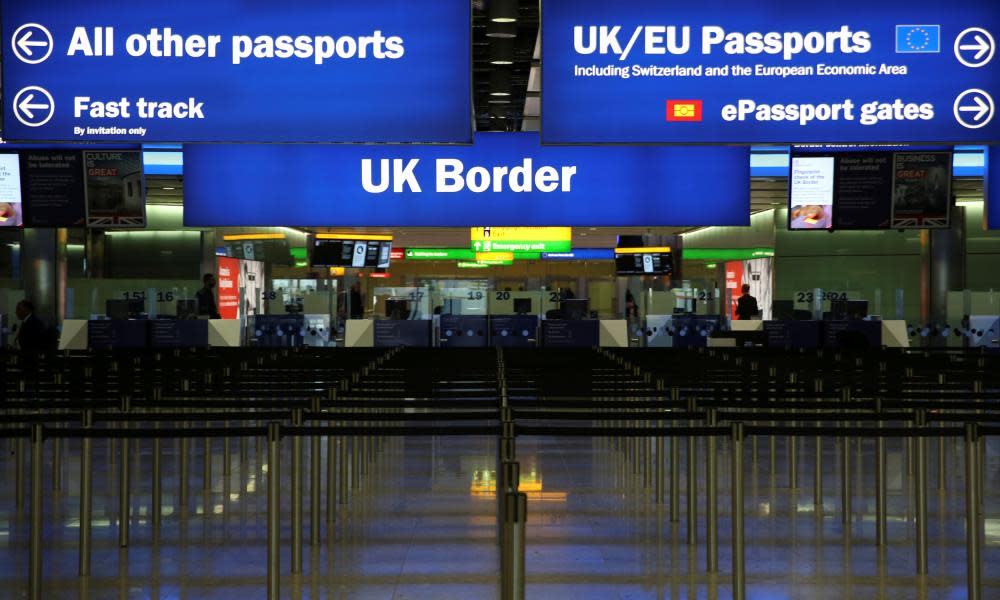Migration committee rejects full points-based system for UK

The independent migration advisory committee has rejected a full shift to an Australian points-based system, publishing detailed research which gives a picture of how a reformed immigration system might look after Brexit and the ending of freedom of movement for EU nationals.
The Conservatives promised to introduce an “Australian-style points-based system to control immigration” as one of six key guarantees listed on page one of their manifesto. The committee’s chair dismissed the notion as a “soundbite”.
“What exactly does an Australian-style points-based system mean?” Prof Alan Manning, the chair of the committee, asked. “The problem is that it means different things to different people.”
Instead its experts recommended a mixed system, which would rely on a minimum salary threshold for those people coming to the UK with a job offer, and a points-based system for skilled workers coming to the UK without an arranged job. “Talented individuals” would be able to apply for a work visa under this points-based system.
The committee’s detailed recommendations would reduce levels of immigration, the size of the UK population and total GDP, Manning said. “We expect the changes to very slightly increase GDP per capita, productivity and improve public finances, though these estimates are more uncertain,” the report states. “The changes are also expected to reduce pressures on the NHS, schools and on social housing, though they will increase pressure on social care.”
Downing Street indicated it was unlikely to notably change course on its immigration plans as a result of the report.
The committee was asked by the home secretary, Priti Patel, last year to research how an Australian points-based system might work. The government is not required to accept its recommendations but is now under pressure to clarify its own vision for a post-Brexit immigration system, which will be governed by the same rules for people inside and outside the EU.
The committee urged politicians to act fast, pointing out that there is not much time left to devise and implement an overhauled system if employers are to have time before the end of the transition period to plan for substantial changes to how they recruit staff.
The government has alluded to the desirability of an Australian-style system for months, without explaining how this might work. This report gives the first assessment of whether it provides a suitable model for the UK economy.
If the government wants a points-based system it should only introduce it for skilled workers without a job offer, the committee concludes. Currently the main way in to the UK for non-EU migrants requires them to have a job. Skilled migrants who come to the UK to take up a job would be allowed to earn £4,400 less than the current £30,000 threshold for non-EU workers, under the proposals.
The committee has recommended reducing the existing salary threshold to £25,600 to make it easier for teachers, NHS employees and people at the start of their careers to qualify. The committee recommends higher thresholds for more highly paid occupations.
Manning said: “No perfect system exists and there are unavoidable, difficult trade-offs. The largest impacts will be in low-wage sectors and the government needs to be clear about its plans for lower-skilled work migration.”
He warned the government to ensure that the mistakes of previous UK points-based systems were not repeated, noting that the UK did have something “pretty close to an Australian points-based system from 2008 and the current system has evolved away from that because of perceived problems with it”.
A No 10 spokesman said: “The government will introduce a firmer and fairer points-based immigration system from 2021 that welcomes talent from around the world while reducing low-skilled migrants and bringing overall numbers down. We will carefully consider the report before setting out further details on the new system.”
Asked if this meant the plans for a primarily points-based system would stay, he said: “As the prime minister has been clear, we will introduce our points-based system from 2021.”
The Federation of Small Businesses gave a cautious welcome to the recommendation but proposed that the minimum income threshold be set at around £20,000. “The recommendation for a route to the UK without a job offer is also positive, but this must be open to mid-skilled workers and not restricted to highly paid professionals,” it said.
The Food and Drink Federation, whose members rely heavily on EU citizens to staff food production sites where British workers are in short supply, said the salary threshold was still too high. It said it was “a step in the right direction” but urged the government to “consider going further still”.
EU nationals make up a quarter of the 430,000-strong workforce in food and drink manufacturing and many businesses will be recruiting under immigration rules for the first time, said the FDF.
London First, which represents some of the capital’s biggest employers, said it was “positive”. But, like many employers, it believes it is unrealistic to set a salary threshold so high when many businesses rely on recruiting staff who earn less than £25,000 a year, including cleaners, security and waiting staff.
Related: Fast-track 'global talent visa' to be launched days after Brexit

 Yahoo News
Yahoo News 
